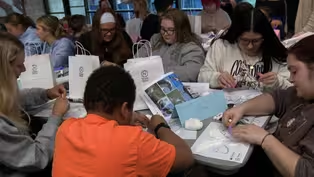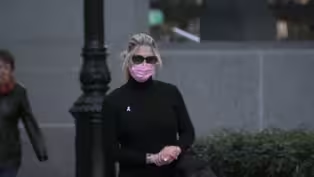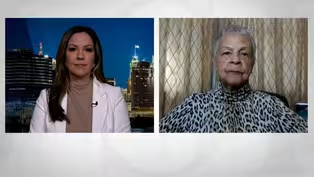NJ Spotlight News
Autism rates on the rise but what's the cause?
Clip: 4/17/2025 | 6m 14sVideo has Closed Captions
Interview: Dr. Walter Zahorodny, autism researcher and clinical psychologist at Rutgers
Autism rates have hit a record high according to new data from the Centers for Disease Control and Prevention released this week. About 1 in 31 children in the U.S. are diagnosed with autism spectrum disorder by their 8th birthday, according to the data. In New Jersey that rate is slightly higher, about 1 in every 29 kids.
Problems playing video? | Closed Captioning Feedback
Problems playing video? | Closed Captioning Feedback
NJ Spotlight News is a local public television program presented by THIRTEEN PBS
NJ Spotlight News
Autism rates on the rise but what's the cause?
Clip: 4/17/2025 | 6m 14sVideo has Closed Captions
Autism rates have hit a record high according to new data from the Centers for Disease Control and Prevention released this week. About 1 in 31 children in the U.S. are diagnosed with autism spectrum disorder by their 8th birthday, according to the data. In New Jersey that rate is slightly higher, about 1 in every 29 kids.
Problems playing video? | Closed Captioning Feedback
How to Watch NJ Spotlight News
NJ Spotlight News is available to stream on pbs.org and the free PBS App, available on iPhone, Apple TV, Android TV, Android smartphones, Amazon Fire TV, Amazon Fire Tablet, Roku, Samsung Smart TV, and Vizio.
Providing Support for PBS.org
Learn Moreabout PBS online sponsorshipautism rates have hit a record high according to new CDC data released this week showing about one in 31 children in the US are diagnosed with autism spectrum disorder by their 8th birthday in New Jersey that rate is slightly higher about one in every 29 kids the findings are based on analysis of medical records from 2022 and reflect a dramatic rise in autism over the past two decades increasing 375% since monitoring began back in 2000 the cause of autism remains unknown and that was the focus of a speech by Health and Human Services Secretary Robert F kennedy Jr on Wednesday in Washington DC where he declared autism is an epidemic and said his office will shift focus to finding environmental factors involved well Walter Zahardney is an autism researcher and clinical psychologist at Rutgers University he's led the CDC sponsored New Jersey autism study for more than 20 years and spoke at that conference with the secretary he joins me now well first of all thank you for your time a lot to be made um from this report we'll get to um your comments that you made after the human services secretary yesterday but but first why do you believe and what does the research show us about why these rates are increasing so dramatically uh well we have very little information about why they're going up it's only clear to me that they are going up and they went up very significantly uh over the past 20 years that we've been monitoring autism in New Jersey uh but we don't really understand what the causes or factors are there we would love to learn those things we would love to learn those things for New Jersey um what are you seeing as far as um factors like demographics um geography is that coming into play with some of these rates well the rate of autism has increased broadly across all the groups that we look at across all race ethnicities all subgroups of autism all levels of impairment uh it would be wonderful for us to understand what's driving these things but we don't know but there has been one important demographic shift that I'd call your attention to and that is that autism uh at the beginning that is from uh 2000 maybe through 2015 was largely uh over represented among affluent and uh white in affluent and white communities whereas more recently in the last uh 5 to seven years it's shifted so that now children from minority and underserved communities are more likely to have autism than their white peers this is something unexpected and something that might be a clue uh about the rising uh rates of autism that that'll take more research though uh yesterday of course there was an event with the human services secretary Robert F kennedy Jr you spoke after him as a leading um research expert on this um where you called it a public health issue um a phenomenon uh even an epidemic um there are of course researchers who disagree with classifying it as that and say um you know there is better uh screening there are more doctors who are able to identify this there's a broader definition of autism and that that has more to do with why we're seeing increased rates why do you disagree none of the three things you mentioned are true i wish these experts would tell us what their evidence is i'm strongly oriented to evidence and data and I don't see any data that shows that autism screening has really made a difference or that there are other factors related to the definition of autism or the awareness of autism in fact when we shifted to the DSM5 definition from the DSM4 definition of autism we took a more conservative uh standard and in spite of being a more conservative set of criteria autism still continues to increase so let's see the evidence of the other experts i'd love to learn from them there's uh a shift it appears anyway at the federal level to change some of the research from looking at genetic factors to perhaps environmental factors what should we expect from that and I know that the secretary said um he would like to give Americans an answer by September how realistic is that well I think there will be a positive shift toward studying environmental risk factors or triggers that can only be positive because there's been an overemphasis in overfunding of the genetics only perspective autism involves both genetic and environmental factors to exclude the environmental factors for such a long time has stymied real progress in the area i don't know how long it'll take for us to uh gain uh some good answers about the autism uh prevalence increase but if we commit ourselves uh we're staking a claim that we're interested in this area and that's positive based off of everything that you have seen and and all of your research over decades how confident are you that environmental factors are at play here yeah I would say I'm very confident i can't put a number on it but the missing piece to our understanding of what's driving autism will be found from environmental factors not from ecology or from sociological factors like better awareness walter Zahari uh thank you for your time uh thanks for sharing the findings of your report good to talk to you thank you [Music]
Broadening access to art for people with disabilities
Video has Closed Captions
Clip: 4/17/2025 | 4m 26s | Noyes Museum of Art at Stockton University collaborates on Access to Arts program (4m 26s)
Candidates for governor questioned on social justice issues
Video has Closed Captions
Clip: 4/17/2025 | 4m 20s | Policies on immigration, policing, housing, race and reparations were examined (4m 20s)
Closing arguments in Nadine Menendez bribery trial
Video has Closed Captions
Clip: 4/17/2025 | 3m 58s | The trial was initially expected to continue through mid-May (3m 58s)
Watson Coleman slams Trump administration for defying court
Video has Closed Captions
Clip: 4/17/2025 | 6m 29s | Interview: U.S. Rep. Bonnie Watson Coleman (6m 29s)
Lawmakers want to expand retirement savings for NJ workers
Video has Closed Captions
Clip: 4/16/2025 | 5m 11s | Interview: John Reitmeyer, budget and finance writer, NJ Spotlight News (5m 11s)
Providing Support for PBS.org
Learn Moreabout PBS online sponsorship
- News and Public Affairs

Top journalists deliver compelling original analysis of the hour's headlines.

- News and Public Affairs

FRONTLINE is investigative journalism that questions, explains and changes our world.












Support for PBS provided by:
NJ Spotlight News is a local public television program presented by THIRTEEN PBS




